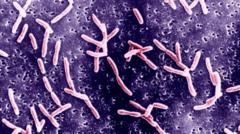In the bustling city of Pune, India, parents are expressing increasing concern as an outbreak of Guillain-Barre Syndrome (GBS) has surfaced, with around 160 reported cases in recent weeks. GBS, a rare neurological disorder, arises when the immune system mistakenly attacks nerve cells, leading to muscle weakness and potentially life-threatening paralysis.
The distressing events unraveled last month when a local teacher discovered her six-year-old son struggling to hold a pencil, incorrectly attributing it to his frustration over homework. Unbeknownst to her, this difficulty in gripping was the initial warning sign of GBS. Within days, the boy's condition deteriorated to where he was placed in intensive care, ultimately losing the ability to swallow, speak, and breathe without assistance. Fortunately, he is now on the road to recovery.
Currently, Pune is home to a surge in GBS cases attributed to a specific strain of campylobacter jejuni, known to be a leading cause of foodborne illnesses. This particular pathogen is recognized as a significant contributor to GBS outbreaks worldwide. Studies in the past have shown that approximately one-third of GBS patients in India had previously tested positive for campylobacter. The recent situation echoes outbreaks elsewhere in the world, such as recent cases in Peru, where over 200 suspected cases have been reported, prompting national emergency measures.
The molecular mimicry phenomenon occurs when the immune system attacks campylobacter yet inadvertently targets the human nerve cells due to similarities in their structures. Experts note that only a few strains of campylobacter carry this risk, rendering the probability of GBS development quite rare—but increasing awareness and preventive measures is crucial, especially considering India’s uneven healthcare landscape.
As authorities mobilize resources for treatment, they are simultaneously pushing public health campaigns, urging individuals to maintain hygiene by consuming well-cooked food and clean drinking water. The World Health Organization has dispatched teams to Pune to assist in tracing and monitoring cases, as local health officials have been surveying thousands of households and gathering water samples in an effort to contain the outbreak.
While the medical community races against time to manage the rising number of GBS cases, the residents of Pune are left to navigate the uncertainties of this unsettling health crisis, urged by officials to remain calm amidst the growing health alerts.





















